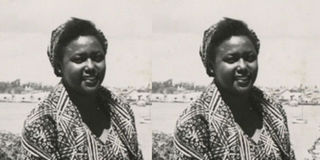Prime
Germany to name a street in Berlin after Tanzanian independence activist

What you need to know:
- Lucy-Lameck-Straße, she was Tanzania's first female cabinet minister as well as a leading figure in the country's independence movement.
Councillors in the German capital, Berlin, have voted to replace a street name honouring a colonial governor in East Africa accused of having ordered massacres.
Wissmannstraße, named after Hermann von Wissmann, is set to become Lucy-Lameck-Straße, a leading female Tanzanian independence activist.
She was Tanzania's first female cabinet minister as well as a leading figure in the country's independence movement.
Von Wissman was governor of German East Africa (now Tanzania, Burundi and Rwanda) in the late 19th Century and is believed to have been behind the mass killings of local people.
Berlin Postkolonial, one of the associations that were involved in bringing changes in German supported the councillors' move to rename the road
“We chose the Tanzanian activist because as opposed to Von Wissman, she fought against colonialism and racism,” wrote the association in a report
“Lucy Lameck represents Tanzanian women who fought hard for the freedom of the country, whose contribution to the Tanzanian independence was not recognized enough,” said a Tanzanian activist, Mnyaka Sururu.

Who is Lucy Lameck?
Lameck was born in 1934 in Moshi uptown, which was then a part of Tanganyika. She was born in farmers’ family, Ms Lameck learnt nursing before getting into politics.
After she was trained to be a nurse in 1950, she decided against taking part in the colonized English nursing system and instead opted to work as a clerk
She was a Tanzanian politician and the first female cabinet minister, Ms Lameck went to Ruskin University at Oxford, England.
She was also deputy minister of health and social development, and in her position she sought for women participation in the country
Ms Lameck’s first time to step into the Tanganyika parliament was in 1960 before, five years before she was formerly chosen to actively participate in the parliamentary affairs in 1965.
She is remembered as a role model who worked almost her entire life to improving the lives of women in Tanzania.





